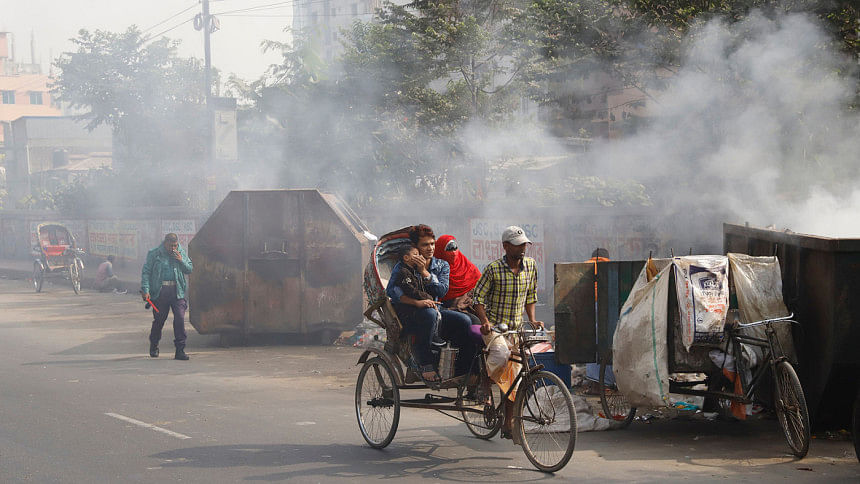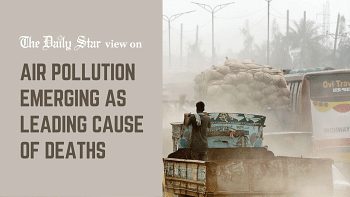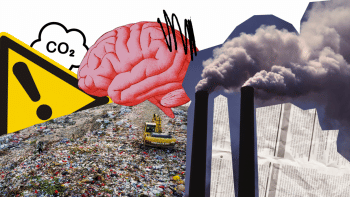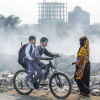Air pollution kills 102,456 Bangladeshis every year

Air pollution is responsible for 102,456 deaths annually in Bangladesh, as per a new study by the Centre for Research on Energy and Clean Air (CREA).
Titled "Public Health Impacts of Fine Particle Air Pollution in Bangladesh", the report highlights the severe consequences of particulate matter (PM2.5), which causes diseases such as ischemic heart disease, stroke, chronic obstructive pulmonary disease (COPD), lower respiratory infections, and lung cancer.
Young children are particularly vulnerable, with 5,258 deaths annually from PM2.5-related lower respiratory infections.
PM2.5 refers to tiny pollution particles, smaller than a fraction of a human hair, that come from sources like cars, factories, and fires.
In Bangladesh, the amount of these harmful particles in the air averages 79.9 micrograms per cubic metre, which is more than double the country's safety limit of 35 and 15 times higher than the World Health Organization's recommended safe level of 5, the report finds.
The report, launched today at the Jatiya Press Club, said Bangladesh ranked as the most polluted country in the world in 2023.
Urban areas face the highest pollution levels, with Dhaka and Chattogram accounting for 48 percent of air pollution-related deaths. Rural and coastal areas experience significantly lower levels of pollution.
The study suggests that controlling air pollution could prevent 5,254 child deaths annually and avert 29,920 deaths from heart disease, 23,075 from strokes, 20,976 from COPD, 9,720 from pneumonia, and 3,063 from lung cancer.
Air pollution-related illnesses lead 669,000 people to seek emergency hospital care annually and result in 263 million lost workdays each year, significantly harming the economy.
The report also attributes 900,485 preterm births and 696,389 cases of low birth weight to air pollution annually.
Achieving the national air quality standard could reduce deaths by 19 percent and improve quality of life significantly, while meeting the WHO guideline could save 81,282 lives annually.
The primary sources of air pollution include industrial emissions, power plants, vehicles, construction activities, waste burning, and seasonal dust storms. Polluted air from neighbouring countries also exacerbates the issue.
A dashboard introduced at the event allows real-time monitoring of pollution levels across cities and districts, aiding decision-making and raising public awareness.
"Bangladesh's air pollution leads to numerous premature births, low birth weights, and childhood deaths annually," said Dr Jamie Kelly, CREA's air quality analyst.
"These outcomes highlight the urgent need for targeted interventions to protect the most vulnerable. Air pollution also weakens the economy, causing 266 million sick days each year, significantly impacting productivity."
CAPS Chairman Prof Ahmad Kamruzzaman Majumder stressed that Dhaka's rising pollution affects both physical and mental health. He cited the 2024 Air Quality Life Index, which shows air pollution has reduced global life expectancy by 2.7 years, while in Bangladesh, it has decreased by 4.8 years.
Speakers, including Swedish Embassy First Secretary (Environment and Climate Change) Nayoka Martinez-Backstrom and Additional Secretary Tapan Kumar Biswas of the Ministry of Environment, called for urgent policy measures. These include promoting clean production, improving energy efficiency, investing in public transport, and enhancing waste management.
Prof Adil Mohammad Khan, president of the Bangladesh Institute of Planners, chaired the event. He emphasised prioritising public health in urban development plans, enforcing stricter regulations, and reforming laws to address air pollution.
Other speakers included Dr Mahbubul Islam, former associate professor of Respiratory Medicine at Shaheed Suhrawardy Medical College, and Syed Mahbubul Alam Tahin, secretary at Centre for Law and Policy Affairs.

 For all latest news, follow The Daily Star's Google News channel.
For all latest news, follow The Daily Star's Google News channel. 









Comments